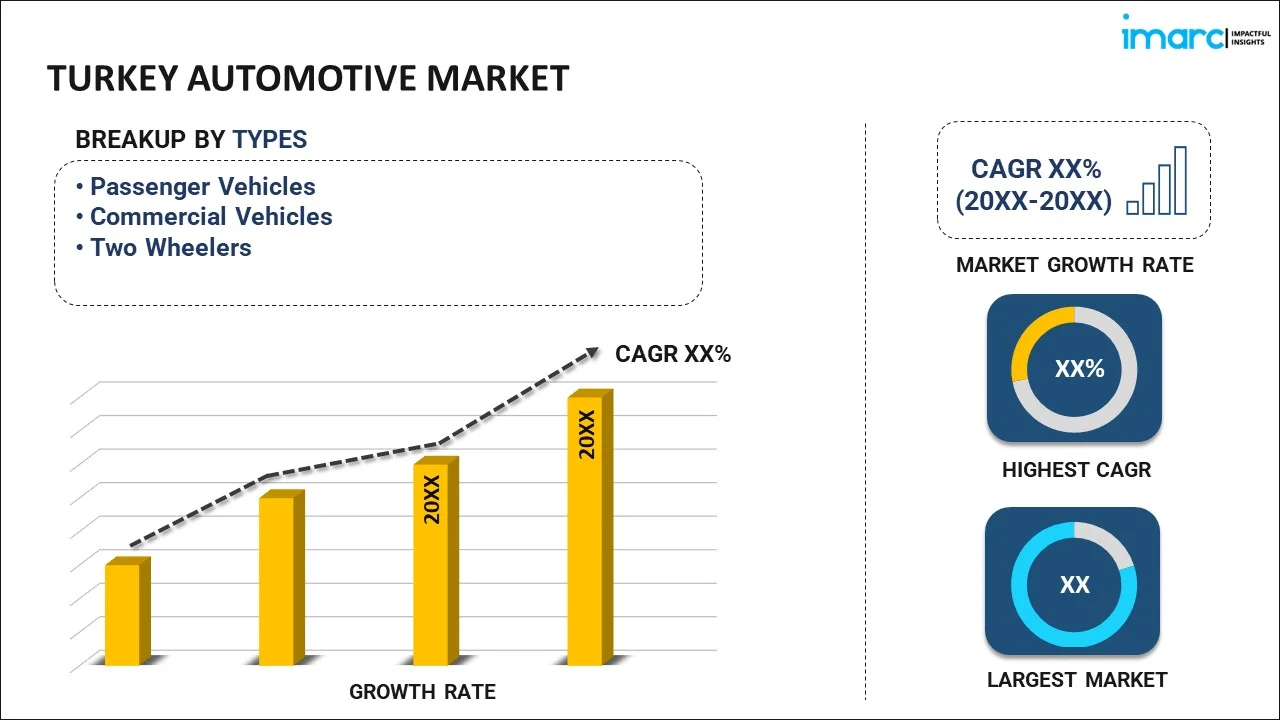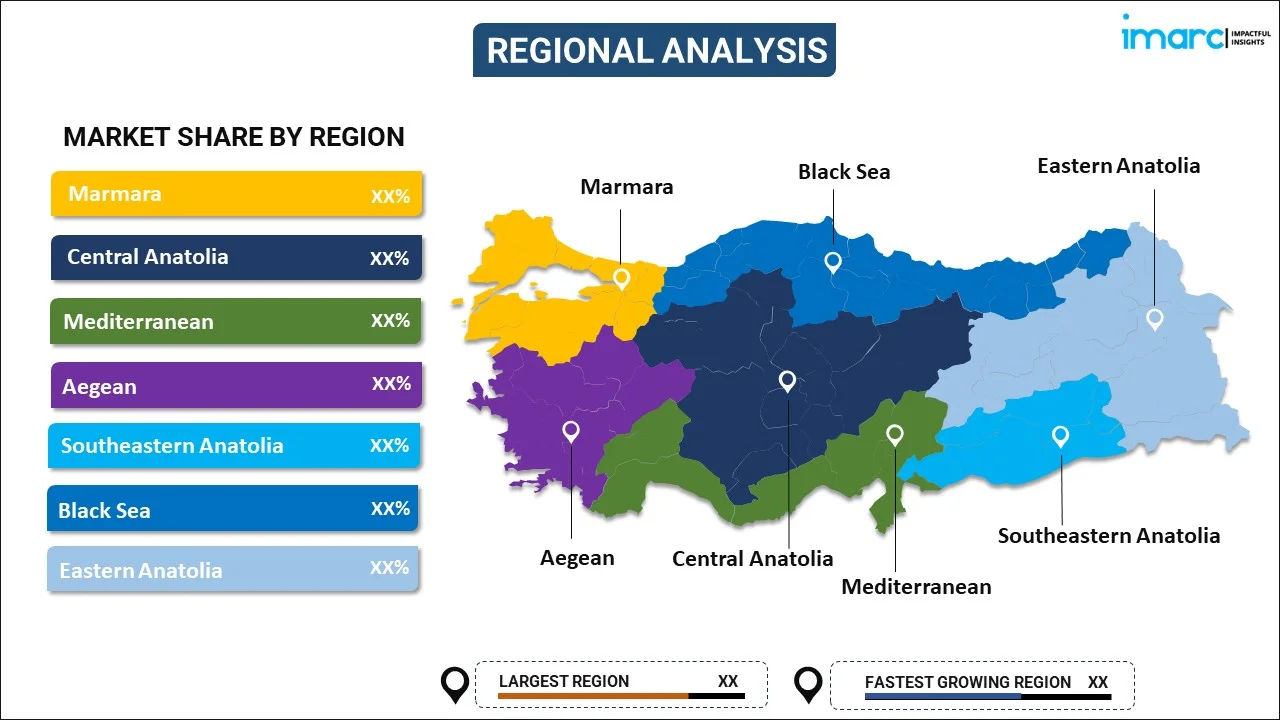
Turkey Automotive Market Report by Type (Passenger Vehicles, Commercial Vehicles, Two Wheelers), Propulsion Type (Gasoline, Diesel, Electric, and Others), Sales Channel (Dealerships, Online Sales, Direct Sales, and Others), and Region 2026-2034
Turkey Automotive Market Overview:
The Turkey automotive market size reached USD 28.2 Billion in 2025. Looking forward, IMARC Group expects the market to reach USD 43.3 Billion by 2034, exhibiting a growth rate (CAGR) of 4.75% during 2026-2034. The market is experiencing significant growth mainly driven by robust domestic demand, strategic location and strong manufacturing capabilities. Government incentives, growing middle class population base and increased foreign investment further drive the market growth, positioning Turkey as a pivotal hub in the global automotive industry.
|
Report Attribute
|
Key Statistics
|
|---|---|
|
Base Year
|
2025 |
|
Forecast Years
|
2026-2034
|
|
Historical Years
|
2020-2025
|
| Market Size in 2025 | USD 28.2 Billion |
| Market Forecast in 2034 | USD 43.3 Billion |
| Market Growth Rate (2026-2034) | 4.75% |
Access the full market insights report Request Sample
Turkey Automotive Market Trends:
Rising Adoption of Electric Vehicles
The electric vehicle (EV) adoption in Turkey is gaining significant momentum, driven by increasing investment in EV infrastructure and manufacturing. For instance, in the first two months of 2024 Turkey's electric vehicle (EV) sales reached 8,255 units positioning the country at sixth place among EU states. The T10X fully electric SUV by Turkish car manufacturer Togg contributed significantly to this increase. With its recent surge in electric car sales, Turkey is anticipated to be among the top five EU countries for EV sales. The Turkish government has implemented various incentives to accelerate the shift towards electric mobility, including tax reductions, subsidies for EV purchases, and reduced registration fees. These measures are designed to make EVs more affordable and attractive to consumers. In addition to financial incentives, the government is actively supporting the expansion of EV charging infrastructure across the country. Investments are being made to establish a widespread network of charging stations, ensuring that EV owners have convenient access to charging points, both in urban areas and along major highways. This development is crucial in addressing range anxiety and enhancing the practicality of owning an EV.
Rise in Domestic Production
Turkey is witnessing a significant expansion in its domestic manufacturing capacities, particularly in the realm of electric and hybrid vehicles. Leading Turkish automotive companies are investing heavily in the development and production of electric and hybrid vehicles. This initiative is part of a broader national strategy to increase local production and reduce dependency on imports. Additionally, global automotive giants with a presence in Turkey are ramping up their production lines to include electric and hybrid models. These companies are leveraging Turkey's skilled labor force and competitive manufacturing costs to produce cutting-edge vehicles that meet international standards. Government support is also pivotal in this expansion. Policies such as incentives for local production, investment in advanced manufacturing technologies, and fostering a supportive regulatory environment are driving this growth. For instance, in 2023, the Turkish auto industry witnessed a significant rise in production reaching nearly 1.5 million units marking the highest output since 2019. The sector experienced an 8.6% annual increase with a 17.5% rise in car production. The total production, including heavy commercial vehicles also soared by 55.2% as compared to the previous year. The expansion of local manufacturing capacities in electric and hybrid vehicles not only strengthens Turkey's automotive industry but also aligns with global trends toward sustainable and environmentally friendly transportation solutions.
Turkey Automotive Market News:
- In January 2024, Turkey's first major electric carmaker Togg unveiled its brand new sedan model T10F at CES 2024, a major consumer electronics and IT fair being held in the United States' Las Vegas, United States.
- In May 2024, HORSE, a global leader in low-emissions powertrain systems signed a multi-year agreement to supply efficient diesel engines to Turkish automotive manufacturer HABAŞ. The 2.0-litre turbo diesel engines will power HABAŞ's Light Commercial Vehicles meeting strict Euro 6d+e full emissions regulations. This partnership marks a significant milestone for HORSE and highlights its commitment to providing advanced powertrains globally.
Turkey Automotive Market Segmentation:
IMARC Group provides an analysis of the key trends in each segment of the market, along with forecasts at the country level for 2026-2034. Our report has categorized the market based on type, propulsion type, and sales channel.
Type Insights:

To get detailed segment analysis of this market Request Sample
- Passenger Vehicles
- Commercial Vehicles
- Two Wheelers
The report has provided a detailed breakup and analysis of the market based on the type. This includes passenger vehicles, commercial vehicles, and two wheelers.
Propulsion Type Insights:
- Gasoline
- Diesel
- Electric
- Others
A detailed breakup and analysis of the market based on the propulsion type have also been provided in the report. This includes gasoline, diesel, electric, and others.
Sales Channel Insights:
- Dealerships
- Online Sales
- Direct Sales
- Others
The report has provided a detailed breakup and analysis of the market based on the sales channel. This includes dealerships, online sales, direct sales, and others.
Regional Insights:

To get detailed regional analysis of this market Request Sample
- Marmara
- Central Anatolia
- Mediterranean
- Aegean
- Southeastern Anatolia
- Blacksea
- Eastern Anatolia
The report has also provided a comprehensive analysis of all the major regional markets, which include Marmara, Central Anatolia, Mediterranean, Aegean, Southeastern Anatolia, Blacksea, and Eastern Anatolia.
Competitive Landscape:
The market research report has also provided a comprehensive analysis of the competitive landscape in the market. Competitive analysis such as market structure, key player positioning, top winning strategies, competitive dashboard, and company evaluation quadrant has been covered in the report. Also, detailed profiles of all major companies have been provided.
Turkey Automotive Market Report Coverage:
| Report Features | Details |
|---|---|
| Base Year of the Analysis | 2025 |
| Historical Period | 2020-2025 |
| Forecast Period | 2026-2034 |
| Units | Billion USD |
| Scope of the Report | Exploration of Historical and Forecast Trends, Industry Catalysts and Challenges, Segment-Wise Historical and Predictive Market Assessment:
|
| Types Covered | Passenger Vehicles, Commercial Vehicles, Two Wheelers |
| Propulsion Types Covered | Gasoline, Diesel, Electric, Others |
| Sales Channels Covered | Dealerships, Online Sales, Direct Sales, Others |
| Regions Covered | Marmara, Central Anatolia, Mediterranean, Aegean, Southeastern Anatolia, Blacksea, Eastern Anatolia |
| Customization Scope | 10% Free Customization |
| Post-Sale Analyst Support | 10-12 Weeks |
| Delivery Format | PDF and Excel through Email (We can also provide the editable version of the report in PPT/Word format on special request) |
Key Questions Answered in This Report:
- How has the turkey automotive market performed so far and how will it perform in the coming years?
- What is the breakup of the turkey automotive market on the basis of type?
- What is the breakup of the turkey automotive market on the basis of propulsion type?
- What is the breakup of the turkey automotive market on the basis of sales channel?
- What are the various stages in the value chain of the turkey automotive market?
- What are the key driving factors and challenges in the turkey automotive?
- What is the structure of the turkey automotive market and who are the key players?
- What is the degree of competition in the turkey automotive market?
Key Benefits for Stakeholders:
- IMARC’s industry report offers a comprehensive quantitative analysis of various market segments, historical and current market trends, market forecasts, and dynamics of the turkey automotive market from 2020-2034.
- The research report provides the latest information on the market drivers, challenges, and opportunities in the turkey automotive market.
- Porter's five forces analysis assist stakeholders in assessing the impact of new entrants, competitive rivalry, supplier power, buyer power, and the threat of substitution. It helps stakeholders to analyze the level of competition within the turkey automotive industry and its attractiveness.
- Competitive landscape allows stakeholders to understand their competitive environment and provides an insight into the current positions of key players in the market.
Need more help?
- Speak to our experienced analysts for insights on the current market scenarios.
- Include additional segments and countries to customize the report as per your requirement.
- Gain an unparalleled competitive advantage in your domain by understanding how to utilize the report and positively impacting your operations and revenue.
- For further assistance, please connect with our analysts.
 Request Customization
Request Customization
 Speak to an Analyst
Speak to an Analyst
 Request Brochure
Request Brochure
 Inquire Before Buying
Inquire Before Buying




.webp)




.webp)












